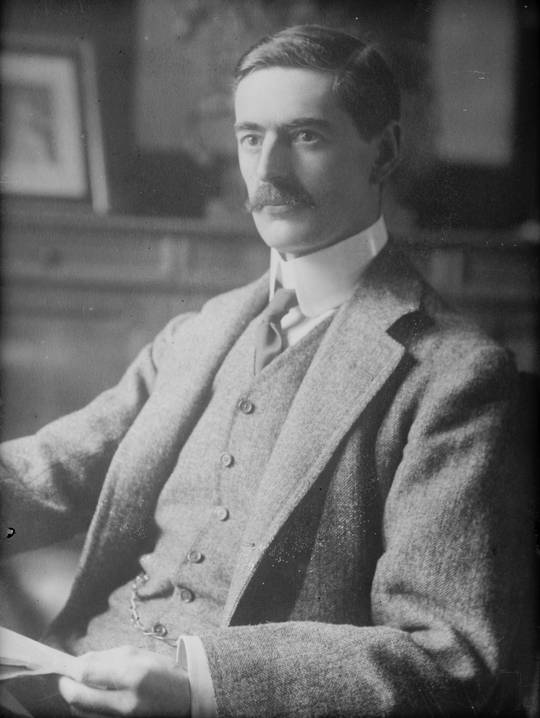Chamberlain’s (1869-1940) background might have been that of an 18th-century Duke; both his father Joseph and half-brother Austen (1863-1937) were leading statesmen. However, he did not go to university but trained as a chartered accountant, then spent six years on a failed sisal plantation in the West Indies, 14 years in business and six years in Birmingham politics before being appointed Director of National Service by Lloyd George in 1917, entering the House of Commons the following year.
Chamberlain was promoted rapidly by Bonar Law and Baldwin in 1922-23, chose the Ministry of Health over the Exchequer in December 1924 and was an outstanding success in that role in Baldwin’s second government. He then became Chairman of the Conservative Party and, when Baldwin was absent on one of his long holidays during the Macdonald government’s 1931 crisis, pushed for a coalition and became Chancellor of the Exchequer in the National Government.
Chamberlain maintained austerity in public finances and avoided Keynesian deficit spending, though he financed a substantial programme of rearmament from 1934, focusing on fighter defence, with programs designing and building Spitfires and Hurricanes. Even more important, in 1932 Chamberlain introduced a moderate scheme of Imperial Preference tariffs, fulfilling his father’s old dream of 30 years earlier and finally balancing somewhat Britain and its colonies’ tariff position against their far more protectionist trading partners. Even though global trade volumes remained far below normal, Britain then enjoyed its best 5-year growth in history.
Chamberlain’s reaction to the Great Depression, not Roosevelt’s meddling with state controls and Keynesian public spending, was the best solution to global economic downturn, as Poland, Latvia and several other countries were to demonstrate anew in 2009-11. Maynard Keynes (1883-1946) meanwhile, cut off by Chamberlain from the Treasury’s inside information, suffered a marked deterioration in his “genius” investment performance for Kings College Cambridge and his other clients.
As Prime Minister, Chamberlain was an effective administrator who continued a well-designed defence build-up and prepared Britain much better for the coming war than had been the case in previous wars. His reputation has however been sullied by the Munich Agreement, which postponed war for a year during which Chamberlain’s rearmament came to fruition, at the cost of Czechoslovakia and Chamberlain’s long-term reputation. In the short term, he was a hero; Margot Asquith described him as “the greatest Englishman that ever lived.”1
The appeasement policy was unfortunately habit-forming; in April 1938 Britain gave away the Irish “Treaty Ports” to the hostile de Valera government, at immense cost in British shipping and lives after war broke out.
Chamberlain’s real mistake however may not have been appeasement, but its reversal by the Polish Guarantee after Hitler occupied the remainder of Czechoslovakia in March 1939. Britain had not helped Poland at its partition in 1792 or at the Congress of Vienna in 1815, when it was at the height of its power; it was completely incapable of effective military action there in its relatively enfeebled state of 1939. Britain needed U.S. help to defeat Hitler’s war machine; there was thus a good case for waiting to declare war until that help finally became available, in 1941 or so. Certainly, American neo-con historians, aching to fight Hitler in 1938 to the last drop of British blood, merely demonstrate a taste for destroying somebody else’s Empire at no cost to themselves.
Munich was a mess, but Chamberlain was a highly effective leader otherwise; imaginative, hard-working and an excellent administrator. He should rank about average.
[1] Nigel Nicolson (ed.), Harold Nicolson. Diaries and Letters 1930–1939 (London: Collins, 1966), p. 371.
